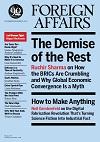Ever since the Chinese leader Deng Xiaoping opened up his country’s economy in the late 1970s, China has managed to grow in power, wealth, and military might while still maintaining cooperative and friendly relations with most of the world. Until a few years ago, that is, when Beijing seemed to change tack, behaving in a way that alienated its neighbors and aroused suspicion abroad.
In December 2009, for example, Beijing’s resistance to compromise at the UN Climate Change Conference angered European countries and the United States. Then, following the January 2010 sale of U.S. arms to Taiwan, the Chinese government suspended a senior U.S.-Chinese security dialogue for the first time and announced unprecedented sanctions against U.S. companies with ties to Taiwan (although it is not clear that the sanctions caused meaningful damage). In July of that year, Beijing angrily protested plans for U.S.–South Korean naval exercises in the Yellow Sea, and in September, it excoriated Japan for detaining the captain of a Chinese fishing boat that had rammed a Japanese coast guard ship in disputed waters.
This article was originally published by Foreign Affairs. You can read the rest of the article here.
You can read exclusive content from Gateway House: Indian Council on Global Relations, here.
Copyright © 2012 by the Council on Foreign Relations, Inc.


